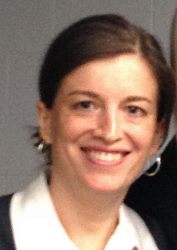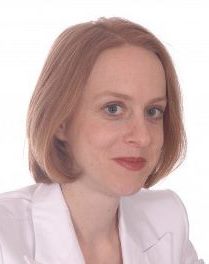Faculty Focus

Victoria Surliuga
Associate Professor, Italian
2010 -

When I was studying at Mount Holyoke College in my twenties, I worked on Late Antiquity and I was planning on becoming an historian. The conversations with my professors, especially Iosif Brodsky and Peter Viereck, led me to a different world, that of literature. I studied the concept of decadence in 19th century French literature, Seneca, Milan Kundera, and the Italian Renaissance, and my plans completely changed. Since my College was not offering a Comparative Literature major, I immediately proceeded to create a special major in the subject. Overall, I decided that I wanted to have the same life, in a creative and intellectually stimulating environment, as my professors. I thought that this was going to be the best of all possible worlds, and I started pursuing my literary ambitions first at Brown University, where I studied with Nancy Armstrong, then on an Excellence Fellowship at Rutgers University, where I had the privilege of getting to know the late Franco Ferrucci.
When I was pursuing my doctoral degree, I became acquainted with many contemporary Italian poets and I wrote my dissertation on three Milanese poets that I found compelling. I have worked for many years on Franco Loi, Giancarlo Majorino, and Giampiero Neri, publishing articles, books, and translations of their work. I have always enjoyed meeting poets and the highlight of my work on poetry was when I met Derek Walcott at a poetry reading in Milan.
As a scholar of Italian Literature, my focus has been the relationship between literature and the visual arts. I have studied the Renaissance and Baroque, and issues related to the Classicist principle of ut pictura poesis (poetry as painting) and the mutual influences between Politian and Botticelli, G. B. Marino and the painters of his age. As my teaching interests increasingly led me more and more in the direction of Italian film, I started considering the intersection of poetry and cinema through Fellini's Casanova, then I expanded my research to stardom and the pivotal role of actresses Sophia Loren, Anna Magnani, Giulietta Masina, and Monica Vitti in the golden years of Italian cinema. I am now also working on Peggy Guggenheim and the Venice Museum that she created. I will present a paper on this topic at a conference in Turin called Intersezioni/Insersections this June.
Last October, I participated with a paper on Giulietta Masina in a conference on Federico Fellini at the University of Toronto. I still have a lot to say about Fellini and the many complex aspects of his films. My work on Fellini is going to take the shape of a book once I complete the one on stardom that I will submit to University of Toronto Press at the end of this year.
I have been most helped in my research by a Humanities grant from the Provost Office, two Arts and Humanities travel awards, as well as a Texas Tech Internal Competitive Funding Opportunity to Advance Scholarship in the Creative Arts, Humanities and Social Sciences from Texas Tech University. I was able to travel to libraries and archives both in the United States and Italy. The funds I received allowed me to visit many libraries in New York, including the Calandra Institute for Italian American Studies and the Guggenheim Archives.
As a creative writer, I have published four books of poetry and I will eventually complete a novel that has been in the works for a few years now. I have received several poetry prizes in Italy (Poetry Prize Francesco Varcasia, 2008; Poetry Prize Parole Sparse, 2007) and my work was selected by the juries of the Astrolabio Prize for the modernity of the poetic language and the Viggiano Prize.
Every year I give a talk in a course that introduces students to graduate work in Medieval and Renaissance Studies and this year I was also invited to give a talk on Italian Stardom at an Honors College luncheon series. I have worked with the organizers of various conferences; however, one of the most satisfying partnerships so far was with the Academy of American Poets this year and last.
My hobbies include painting, playing the piano, watching films, walking, and traveling.
About the Italian Program:
As far as the Italian Program is concerned, since I have been at Texas Tech University, I have been active in obtaining extramural support to give scholarships to undergraduate students minoring in Italian. I have organized events such as lectures and Italian receptions to give visibility to the program but also to keep the Italian Consulate of Houston involved with our program. As a result, the Italian Consul has once visited and the Italian Foreign Ministry has generously supported the Italian Program. When I joined Texas Tech University as Italian Program Coordinator, only two levels of Italian were offered. I was able to create a wide range of courses at all levels and the Italian Program is still growing. Italian is offered at the Elementary and Intermediate levels. Advanced Italian is offered in a sequence of two courses in Italian Conversation. Two film classes, one on Federico Fellini, the other a Survey of Italian Cinema, are also offered, and next spring I will teach a CMLL course that I got approved on World Cinema.
Anita McChesney
Assistant Professor, German
2010-

Anita McChesney joined Texas Tech University as Assistant Professor of German in 2010. She is the Graduate Advisor and served four years as German Club Advisor. Her teaching and research interests include 20-21st-century German and Austrian literature and culture, literary and genre theory, in particular the detective novel, and the relationship between visual media and narration. Recent publications include articles on constructions of truth in detective stories by authors such as E.T.A. Hoffmann and Peter Handke, and on intersections of media, narration and Austrian history in the novels of Gerhard Roth and Christoph Ransmayr. Her current research examines Austrian crime fiction as a tool of socio-historical critique. This interdisciplinary project examines how contemporary crime novels and films expose problems in Austrian society, from the cold apathy in the cities or the stagnant subsistence in the provinces, to a shared disavowal of the shadows of Austria's Imperial and National Socialist past.
Her fascination with foreign languages and cultures began early on. Born in Rhodesia, Africa, she spent her first fourteen years soaking up the vibrant cultures of Zimbabwe, Indonesia and Singapore. A spontaneous decision to study abroad in Austria her senior in college expanded into three years and determined a career teaching German languages and cultures. She earned a Ph.D. from the Johns Hopkins University in 2005 and taught German at the University of Notre Dame before coming to Texas Tech University. When she is not in the office, she enjoys reading, baking and travelling.
McChesney enthusiastically contributes to the dynamic German BA and MA programs at TTU. German is a critical world language for numerous historical, cultural and economic reasons. German has the largest number of native speakers in the European Union, and is the second most commonly used scientific language in the world. The German economy ranks number one in Europe and number four worldwide, Germany is the world's second-largest exporter, and is home to numerous international corporations. German-Americans make up the single largest heritage group reported in the US (approximately 15%). German cultural heritage is particularly strong in Texas. Germans are the largest ethnic group in Texas derived directly from Europe, and form the third-largest national-origin group in the state. German festivals are still widely celebrated throughout Texas. Given Germany's rich cultural history and its prominent global position, the German Program at TTU offers students excellent career opportunities. The BA in German broadens students' cultural literacy, but also develops abilities to think analytically and to express themselves competently, tangible skills which serve all students regardless of their professional goals. A German BA also is an ideal complement to majors such as art, philosophy, history, business, engineering, and the sciences. Graduates of the German MA Program at Texas Tech have been very successful and have gone on pursue professional careers in academia, teaching, international business, foreign service, and related fields.
A recent addition to the program is a summer faculty-led study abroad program in Munich, Germany, which was launched last summer by Professor Charles Grair. Anita McChesney looks forward to guiding an enthusiastic group of students through German language and culture in Munich in Summer 2014.
Classical & Modern Languages & Literatures
-
Address
CMLL Building, 2906 18th St, Lubbock, TX 79409 -
Phone
806.742.3145
